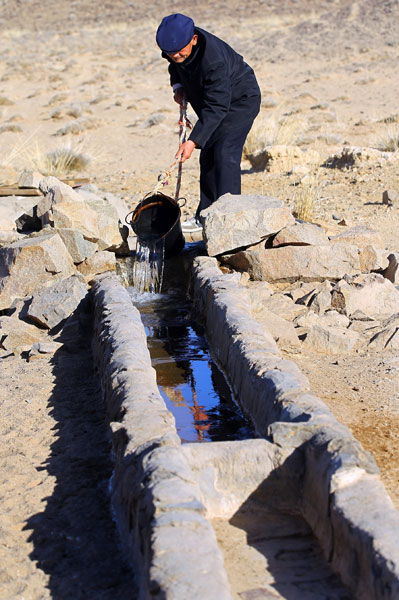An ancient land in change
Updated: 2013-01-21 08:51
By Cui Jia (China Daily)
|
||||||||
To expose the seam of coal, the topsoil has been removed layer by layer. It has become a man-made black canyon stretching as far as the eye can see. The air around the mine is filled with the toxic fumes released by the coal as it combusts on exposure to direct sunlight.
"The opencast mine has cut the earth wide open and destroyed the grassland for ever," Bariba said. "I feel I'm bleeding inside every time I see it."
However, he admitted that the mines also bring jobs. Many herdsmen have traded in their livestock for trucks, and have transformed themselves from "camel boys" to well-paid drivers, transporting ore from the desert. Many park their huge trucks next to their houses.
Bayishi Hule had just returned from his pasture, more than 100 km away from the family home in the center of town. Although the 38-year-old herdsman visits the town twice a month, the rest of his time is spent out on the black Gobi, just like the numerous generations that came before him.
His wife has urged him to buy a truck because she heard that their neighbor has made a fortune, but his ambitions go no further than swapping his yurt on the Gobi for a brick shelter. "I will continue being a herdsman, but I don't want my son to do it. I want him to study hard and become a businessman."
Bariba, because of poor health and advancing years, has hired a worker to graze his goats. In the meantime, the herder remains in the comfort of his house, watching the news on satellite TV instead of listening to his beloved radio. However, he doesn't fully trust his understudy and often makes random visits to the pen to inspect his work. "No one can take care of my goats better than I do."
Also, thanks to a wind farm that began operations at the end of 2011, the residents of Mazongshan can finally enjoy the benefits of electricity 24 hours a day. Before the wind farm was established, the town's electricity came from small diesel generators that only provided a few hours of power each day.
Bariba's three daughters and one son have all abandoned the herding life and have found jobs outside the Gobi. "Herding in the Gobi has become increasingly difficult, and many young people have decided to work elsewhere. I fear that there won't be many of us left here in the future," he said, looking at a portrait of Genghis Khan, the founder and Great Khan of the Mongol Empire, that hangs in his house next to a model of Tian'anmen Square in Beijing.
"The herding lifestyle that was passed down by our Mongolian ancestors is facing huge changes. People are leaving the grassland in search of better opportunities - I really don't know if that's a good or bad thing," he admitted.
Contact the reporter at cuijia@chinadaily.com.cn
Jiang Xueqing and Tang Yuecontributed to this story.
 |
|
Bariba digs a well in the Gobi to water his mountain goats. Photos by Zou Hong / China Daily |

 Li Na on Time cover, makes influential 100 list
Li Na on Time cover, makes influential 100 list
 FBI releases photos of 2 Boston bombings suspects
FBI releases photos of 2 Boston bombings suspects
 World's wackiest hairstyles
World's wackiest hairstyles
 Sandstorms strike Northwest China
Sandstorms strike Northwest China
 Never-seen photos of Madonna on display
Never-seen photos of Madonna on display
 H7N9 outbreak linked to waterfowl migration
H7N9 outbreak linked to waterfowl migration
 Dozens feared dead in Texas plant blast
Dozens feared dead in Texas plant blast
 Venezuelan court rules out manual votes counting
Venezuelan court rules out manual votes counting
Most Viewed
Editor's Picks

|

|

|

|

|

|
Today's Top News
Boston bombing suspect reported cornered on boat
7.0-magnitude quake hits Sichuan
Cross-talk artist helps to spread the word
'Green' awareness levels drop in Beijing
Palace Museum spruces up
First couple on Time's list of most influential
H7N9 flu transmission studied
Trading channels 'need to broaden'
US Weekly

|

|








